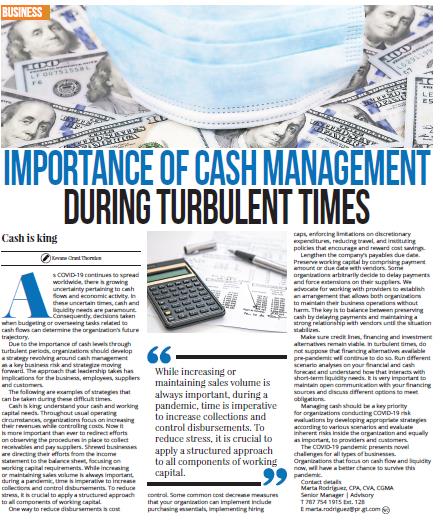Importance of Cash Management During Turbulent Times
07 Oct 2020Importance of Cash Management During Turbulent Times
The Weekly Journal
As COVID-19 continues to spread worldwide, there is growing uncertainty pertaining to cash flows and economic activity. In these uncertain times, cash and liquidity needs are paramount. Consequently, decisions taken when budgeting or overseeing tasks related to cash flows can determine the organization’s future trajectory.
Due to the importance of cash levels through turbulent periods, organizations should develop a strategy revolving around cash management as a key business risk and strategize moving forward. The approach that leadership takes has implications for the business, employees, suppliers and customers.
The following are examples of strategies that can be taken during these difficult times.
Cash is king; understand your cash and working capital needs. Throughout usual operating circumstances, organizations focus on increasing their revenues while controlling costs. Now it is more important than ever to redirect efforts on observing the procedures in place to collect receivables and pay suppliers. Shrewd businesses are directing their efforts from the income statement to the balance sheet, focusing on working capital requirements. While increasing or maintaining sales volume is always important, during a pandemic, time is imperative to increase collections and control disbursements. To reduce stress, it is crucial to apply a structured approach to all components of working capital.
One way to reduce disbursements is cost control. Some common cost decrease measures that your organization can implement include purchasing essentials, implementing hiring caps, enforcing limitations on discretionary expenditures, reducing travel, and instituting policies that encourage and reward cost savings.
Lengthen the company’s payables due date. Preserve working capital by comprising payment amount or due date with vendors. Some organizations arbitrarily decide to delay payments and force extensions on their suppliers. We advocate for working with providers to establish an arrangement that allows both organizations to maintain their business operations without harm. The key is to balance between preserving cash by delaying payments and maintaining a strong relationship with vendors until the situation stabilizes.
Make sure credit lines, financing and investment alternatives remain viable. In turbulent times, do not suppose that financing alternatives available pre-pandemic will continue to do so. Run different scenario analyses on your financial and cash forecast and understand how that interacts with short-term liquidity needs. It is very important to maintain open communication with your financing sources and discuss different options to meet obligations.
Managing cash should be a key priority for organizations conducting COVID-19 risk evaluations by developing appropriate strategies according to various scenarios and evaluate inherent risks inside the organization and equally as important, to providers and customers.
The COVID-19 pandemic presents novel challenges for all types of businesses. Organizations that focus on cash flow and liquidity now, will have a better chance to survive this pandemic.

